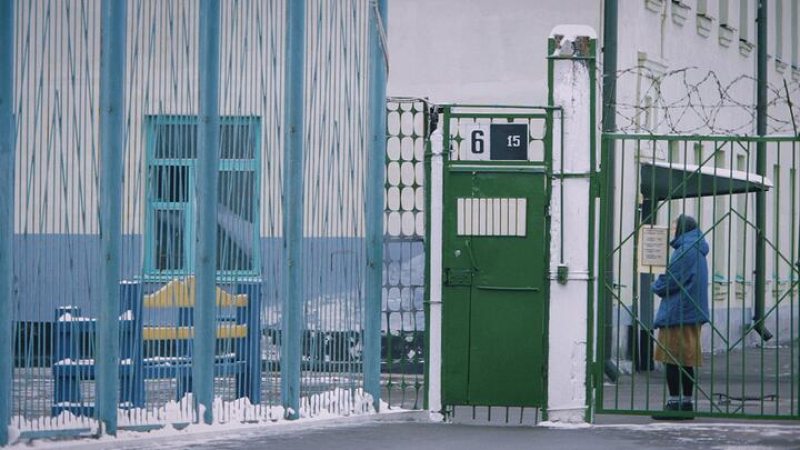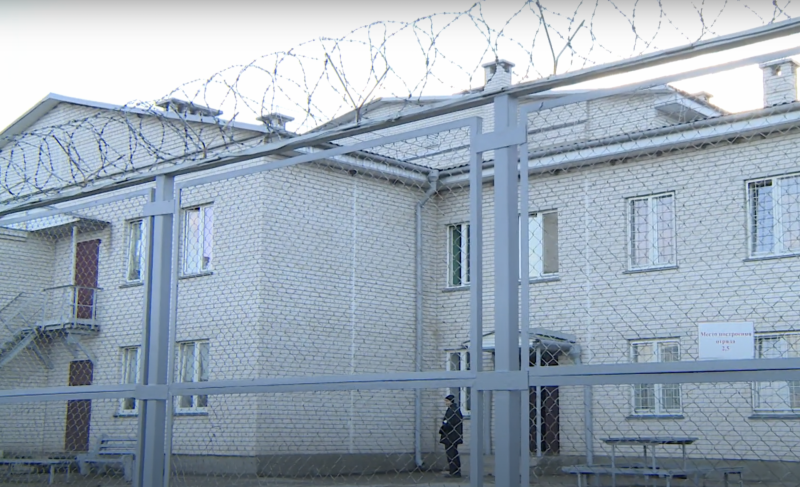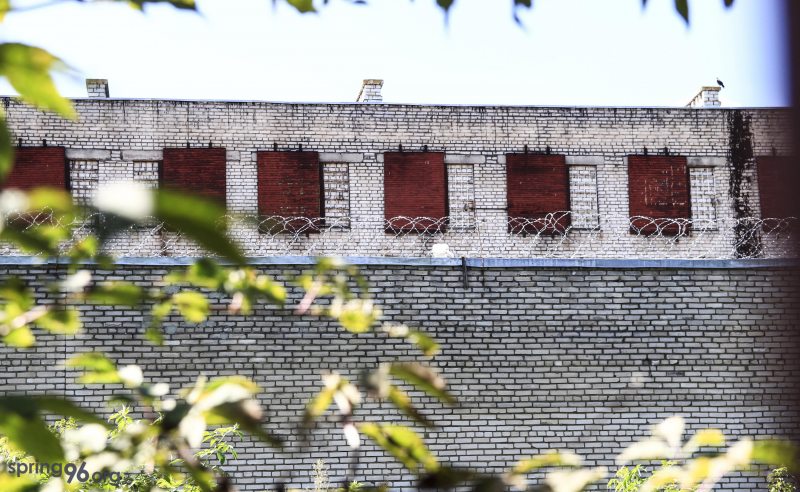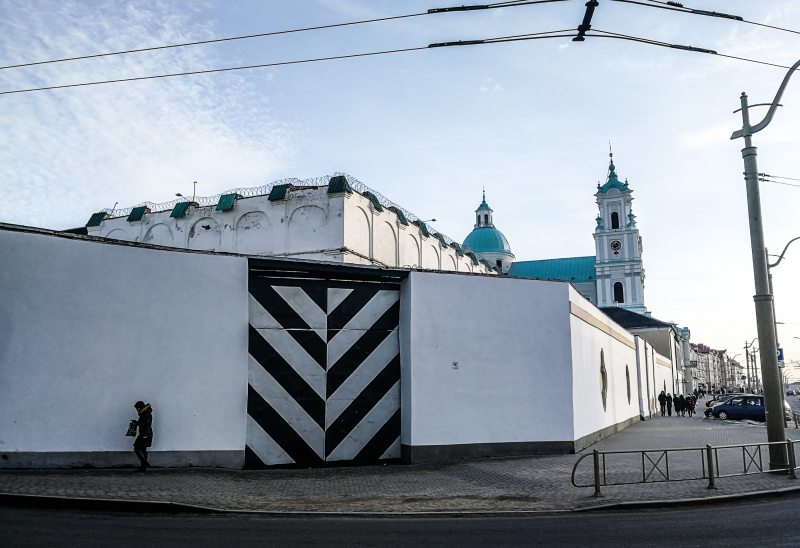"The routine is organized in such a way that you can get a "violation" record at any moment." Why political prisoners do not get early release
The Criminal Code of Belarus provides convicts with ample opportunities to get early release. This includes replacing the unserved part of the punishment with a more lenient one, parole, amnesty, and even pardon. But in reality, political prisoners are deprived of those option. The administrations of correctional facilities seek to make almost all political prisoners "malicious violators of the regulations " in order, among other things, to deprive them of the opportunity for early release. And the application for pardon in places of incarceration has long been an element of pressure on political prisoners. We discuss with former political prisoners and human rights defenders, why none of the options for political prisoners to be released early work.

- Illustration photo, Homieĺ colony No. 4
Parole, or "every political prisoner is put on list of those "prone to extremist and other destructive activities."
According to Part 2 of Article 90 and Part 2 of Article 119 of the Criminal Code, one of the conditions for early release of a convicted person from the punishment is their "exemplary behavior proving the correction of personality." That is, it does not apply to convicts who have violations. According to human rights activist and former political prisoner Leanid Sudalenka, political prisoners are accused of such violations for far-fetched reasons. This is done to exclude the possibility of early release from the colony.
"The circle closes. Although formally, the law gives the right to appeal against the penalty, but in reality no one uses this option. I once told the guard that I don't smoke at all and go out to exercise, to which he replied: "I heard you, well done!" And an hour later, the inspectors were rummaging through my personal belongings, where they found a toothpick that had fallen out of a pack. Of course, it had not been included in the description of my belonging, and this is a violation! When after a year one violation expires, a new one is immediately fabricated, and the heads of the detachments are personally responsible for this."
As Leanid Sudalenka recalls, a week after his arrest, the administration of Homieĺ pre-trial detention center No. 3 put him on the list of prisoners "prone to extremist and other destructive activities."
"The constitutional presumption of innocence could not stand the internal police instructions. All political prisoners are put on that list and it is impossible to avoid it. And as soon as you get to the colony, they put a distinctive yellow tag on you confirming your status."
Another condition is the actual serving the set time by the convicted person. Leu, another political prisoner who did his time in Vitba, adds:
"If a person just gets into the colony, they tell him that not enough time has passed for him to get parole. In some cases, they come up with a violation right away: often this is a discrepancy between person's belongings and the list describing them.
After all, the rules for writing this list are incomprehensible and inconvenient: there are things that you take and return, and you can just get confused, for example, in the number of envelopes, notebooks, or grams of tea. The administration uses this to say at the parole board that "you've just arrive to the colony, and immediately there's a violation."
The routine is organized in such a way that you can get a "violation" record at any moment: you did not say hello in the prescribed way, did not do the work quota while no one did and it is unrealistic to do, etc."

- Penal colony No. 22. Screenshot from a film by TRK Brest channel
According to Part 2 of Article 91 of the Criminal Code, the replacement of the unserved part with a more lenient punishment can be applied to convicts who "firmly stand on the path of correction."
The human rights defender notes that for a political prisoner, one violation is enough to categorize them as a "prisoner who has not taken the path of correction":
"It is also impossible to avoid this. For example, the head of the squad called me and immediately said: "Choose yourself: you smoked in the wrong place or did not go out to exercise." Even one violation in a year is enough for a prisoner to be categorized as "a prisoner who has not taken the path of correction." And political prisoners have several such violations. For example, I had seven in a year, because they wanted to make me a "malicious violator" (for this you need three or more violations per year). When after a year one violation expires, a new one is immediately fabricated, and the heads of the detachments are personally responsible for this."
They carry out a formal check and note: "Refused, has not taken the path of correction." Although for ordinary convicts, such benefits work. Prison employees try to extract money from such convicts for various economic needs of the colony, promising parole. One ordinary convict complained to me that he was tired of feeding the prison: paying for the paint, then for the wallpaper. The employees ask to transfer money, and the parole board says: "We haven't examined you yet." Then this convict said: "I will serve my whole term, but now I will not give you even a ruble!"
Amnesty, or "I could have gone home, but I was a violator"

- Prison in Mahilioŭ. Photo: spring96.org
Amnesty is regulated by Article 95 of the Criminal Code, and each time its conditions are determined by a special law. During the four years of mass persecution in Belarus, only four political prisoners serving time in an open-type correctional institution were amnestied. This happened in 2023. Among them is the former owner and editor-in-chief of Novaya Hazeta Smarhoni Ramuald Ulan. He wrote about this on his Facebook:
"During the sixth month of the amnesty, they amnestied me as well: the only one of two dozen political prisoners in Homieĺ open-type correctional institution..."
It should be noted that this happened only because Article 188 of the Criminal Code (libel), under which the political prisoner was convicted, was not included in the list of those that prevent amnesty.
Amnesty cannot be applied to political prisoners in the colonies due to the fact that the absolute majority of them have been given the status of "malicious violators of the regulations". In each amnesty law, it is noted that it does not apply to "violators of the regulations for serving a sentence." Interior Minister Ivan Kubrakou said those convicted of "extremism" and "terrorism" will not be granted amnesty in 2024.
"In December 2022, an amnesty was just announced, and I could have gone home, but I was a "violator," recalls Leanid Sudalenka.
Pardon, or "also a refusal"

- Hrodna prison. Photo: Viasna
According to Article 96 of the Criminal Code, "pardon is granted by the President of the Republic of Belarus." Since 2020, 29 political prisoners have been pardoned in Belarus. Among them are volunteer Tatsiana Lasitsa, Radio Svaboda journalist Aleh Hruzdilovich, editor of the Black Book of Belarus Sofia Sapega and former Nexta editor Raman Pratasevich, Swiss citizen Natallia Khershe. The application for pardon, especially in 2021-2022, has become a massive element of pressure on political prisoners. According to the testimonies of former prisoners, some of them were forced to write an application addressed to Lukashenka, admitting guilt and recognizing the legitimacy of Lukashenka with their application. For some of them, this was a matter of principle.
"Political beliefs have become a marker for those who are discriminated among the entire mass of convicts by the current totalitarian government in Belarus"
Human rights activist Leanid Sudalenka, having felt all the injustice and cruelty of the Belarusian penitentiary system towards political prisoners, notes:
"Thus, legislation is on its own, and practice goes in the other direction. No one thinks about the re-education of political prisoners and other prisoners in places of incarceration. On the contrary, they think how to make the lives of political prisoners unbearable..."
Viasna lawyer Pavel Sapelka draws conclusions based on international standards:
"The Human Rights Committee, in General comment No. 35, Article 9 of the International Covenant on Civil and Political Rights (Freedom and Personal Integrity), notes that "convicted prisoners have the right to have their sentences regulated in accordance with domestic law. The consideration of cases for conditional and other forms of early release must be carried out in accordance with the law, and such release cannot be refused on grounds that are arbitrary within the meaning of Article 9." In the Committee's view, the concept of "arbitrariness" should include elements of unacceptability, injustice, unpredictability, and non-compliance with procedural guarantees, along with elements of expediency, necessity, and proportionality. In the practice of Belarusian places of detention, these elements flourish, discriminatively depriving political prisoners of the opportunity, if not to be released unconditionally and with subsequent rehabilitation, then at least to have their terms of undeserved illegal imprisonment reduced using those tools that are available to those convicted of ordinary crimes. Political beliefs have become a marker for those who are discriminated among the entire mass of convicts by the current totalitarian government in Belarus."

















